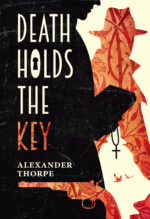It’s the last gasp of the 1920s and a man is dead in a locked room: welcome to Alexander Thorpe’s world of hot and crusty, lanolin-coated cosy crime

In Death Leaves the Station we were introduced to a nameless mendicant monk who helped solve a baffling crime in Western Australia’s Outback. Now the monk’s road leads him to the wheatbelt where despised landholder Fred O’Donnell is discovered with a fatal bullet wound, all by himself in a locked room. It’s a classic plot handled in a deftly untraditional way. Here’s the skinny from Alexander Thorpe.
Death Holds the Key is the second book in the Mendicant Mysteries series. Were there some themes you particularly wished to explore in this book?
I look at these stories mainly as entertainment – writing them is entertaining, and with any luck, reading them is entertaining, too – but it’s hard to write a crime novel without exploring the idea of justice. There’s a long history of whodunnits being used to shed light on what justice looks like in a particular time and place: who has access to it, and who shapes it. While a lot has changed since 1928, there are clear parallels between the people who were denied access to justice then and those who are still struggling to access it now, and I found it impossible to write the story without exploring those connections.
Why did you choose DC Hartley as the sleuth the mendicant accompanies on this investigation?
In the first book, the mendicant was working with a police officer who had an inflated sense of his own importance – someone who had grown too comfortable with the power of his position. He and the mendicant approached things from opposite sides, often confrontationally. After that, I wanted to see how the mendicant would work with someone who had a completely different relationship with policing, a man at the very beginning of his career who isn’t at all comfortable being an authority figure. I think it results in something more akin to the relationship between Holmes and Watson, something based on mutual respect and appreciation.
How did you go about researching the world of late 1920s Mid West? Were there any surprises?
I’m addicted to Trove, the National Library’s online database. I actually did a little happy dance when the government passed a bill to continue funding it – I think I read more newspapers from 1928 than I did from 2022 while I was writing this book. I also read plenty of fiction from around that time to try to get a broader context and a feel for the way people spoke. As with the first book, it was fascinating to re-evaluate my idea of how specific historical trends and technologies spread; the fact that the hospital in Albany had an X-ray machine before it had a phone pops back into my head at least once a week.
What is next for our mendicant?
He’s eventually heading back to the UK to try to seek redress for past wrongs, but he’ll be sidetracked by a few things on the way (funny how these amateur detectives seem to attract so many murders, isn’t it?). The next book is in its infancy, but it does look as though someone might try to stab him with a harpoon, so that’ll be a fun change of pace.
Death Holds the Key and Death Leaves the Station are both available now in all good bookstores and online. Join Alexander at the Great Big Book Club on DATE. Stay tuned for tickets!



